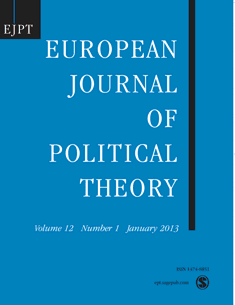
European Journal of Political Theory
Scope & Guideline
Illuminating the complexities of modern governance.
Introduction
Aims and Scopes
- Interdisciplinary Political Analysis:
The journal emphasizes the integration of political theory with insights from history, philosophy, sociology, and economics, allowing for a rich and nuanced understanding of political phenomena. - Normative and Empirical Approaches:
It balances normative political theory with empirical analysis, addressing not only what political systems ought to be but also how they function in practice. - Focus on Justice and Ethics:
The journal frequently addresses themes of justice, ethics, and moral philosophy, reflecting on how these concepts apply to contemporary political challenges. - Engagement with Contemporary Issues:
It explores pressing global issues such as climate change, migration, and political corruption, situating theoretical discussions within real-world contexts. - Historical Contextualization:
The journal often revisits historical political theories and figures, examining their relevance to modern political discourse and challenges. - Pluralism and Diversity in Political Thought:
It promotes the exploration of diverse political traditions, including feminist, postcolonial, and indigenous theories, facilitating a broader understanding of political dynamics.
Trending and Emerging
- Climate Justice and Political Action:
Recent articles increasingly address the intersection of climate change and political theory, reflecting a heightened awareness of environmental issues and their implications for justice and governance. - Corruption and Political Ethics:
There is a growing focus on political corruption, its ethical implications, and institutional responses, indicating a broader concern with integrity in governance and the functioning of political institutions. - Democratic Innovations and Participation:
Emerging themes around democratic innovations, including participatory governance and new models of representation, highlight a trend toward rethinking democratic practices in light of contemporary challenges. - Migration and Global Justice:
The journal is increasingly publishing on themes of migration, refugee rights, and global justice, recognizing the complex moral and political issues surrounding mobility in a globalized world. - Intersection of Technology and Politics:
There is a notable rise in discussions about the impact of technology on political theory, including issues related to digital governance, surveillance, and the implications of algorithmic decision-making. - Collective Agency and Responsibility:
Recent papers emphasize collective forms of agency and responsibility, particularly in the context of social movements and global challenges, indicating a shift towards understanding political action as a collective endeavor.
Declining or Waning
- Traditional State-Centric Theories:
There has been a noticeable decline in papers focusing solely on traditional state-centric theories of politics, as contemporary discussions increasingly emphasize global, transnational, and decentralized perspectives. - Purely Ideological Debates:
The journal has shifted away from purely ideological debates that do not engage with empirical realities, favoring more practical discussions that tie theory to lived experiences. - Historical Exclusivity:
While historical analyses remain relevant, there appears to be a waning focus on exclusive historical narratives that do not connect to contemporary issues or pluralistic viewpoints. - Overly Abstract Theoretical Constructs:
Papers that focus solely on abstract constructs without practical implications or relevance to current political issues seem to be less frequent, indicating a preference for grounded theoretical discussions. - Neglect of Localized Political Issues:
There is a decrease in the coverage of localized political issues that do not have broader implications, suggesting a trend toward more global and universal themes in political theory.
Similar Journals

Interpretation-A Journal of Political Philosophy
Advancing Understanding in Political PhilosophyInterpretation - A Journal of Political Philosophy, published by INTERPRETATION, INC, serves as a pivotal forum for scholars and practitioners alike to explore the nuanced intersections of philosophy and political theory. This esteemed journal, bearing the ISSN 0020-9635, has been instrumental in advancing discourse in the field, particularly during its coverage from 2002 to 2018. Although access options remain conventional, the journal's robust contributions to arts and humanities, alongside its insightful pieces in sociology and political science, ensure its relevance despite the discontinuation of indexing in Scopus. With its ranking within the lower percentiles in both philosophy and political science, Interpretation continues to challenge emerging thinkers to critically engage with fundamental political questions. It stands as a significant resource for researchers, professionals, and students dedicated to enriching their understanding of the philosophical underpinnings that shape political discourse.

Sophia
Exploring the Depths of Philosophy and FaithSophia, a prestigious journal published by Springer, is a leading platform for the advancement of knowledge in the fields of Philosophy and Religious Studies. Established in 1962, this open-access journal has embraced a global perspective and invites scholarly contributions that explore complex philosophical questions and the intricacies of religious thought. With an impact factor that reflects its significance, Sophia ranks in the top quartiles of its categories on Scopus, specifically Q2 in Philosophy and Q1 in Religious Studies, showcasing its influence and reach within the academic community. With convenient open access options available since 2009, the journal ensures that research disseminates freely, promoting engagement among researchers, professionals, and students alike. Located in the Netherlands and connected to a reputable international network, Sophia remains committed to fostering intellectual dialogue and enriching the discourse surrounding philosophical and religious issues worldwide.

FILOSOFICKY CASOPIS
Advancing Interdisciplinary Dialogue in Philosophy and ReligionFilosoficky Casopis is a distinguished open-access journal dedicated to exploring the multifaceted dimensions of philosophy and religious studies. Published by the Institute of Philosophy in the Czech Republic, this journal aims to foster interdisciplinary dialogue and contribute to the evolving debates within these fields. With an ISSN of 0015-1831 and a publication history that spans converged years from 2002 to 2024, Filosoficky Casopis offers valuable insights into contemporary philosophical discourse. Despite its current standing in the Q4 quartile in the 2023 rankings for Religious Studies, the journal remains committed to elevating discussions and providing a platform for emerging scholarship. Since adopting an open-access model in 2021, it has expanded its reach and accessibility, ensuring that its content is readily available to researchers, professionals, and students alike. The journal's address is located at Jilska 1, Prague 110 00, Czech Republic, and it stands as a noteworthy publication for those interested in advancing their understanding of philosophical inquiry and its intersection with religious thought.

Ethical Theory and Moral Practice
Illuminating the Intersections of Morality and Social PhilosophyEthical Theory and Moral Practice is a distinguished academic journal published by SPRINGER, focusing on the intricate intersections of ethics, morality, and social philosophy. With an ISSN of 1386-2820 and E-ISSN 1572-8447, it has been a vital platform for scholarly discourse since its inception in 1999, converging its publication years from 1999 to 2002 and then from 2004 to 2024. The journal holds an impressive standing in the academic community, reflected by its Q1 ranking in Philosophy and Q2 in Social Sciences (miscellaneous) for 2023, as well as its notable Scopus rankings in both Arts and Humanities and Social Sciences. Despite being a subscription-based journal, it plays a crucial role in shaping contemporary ethical discussions and provides researchers, professionals, and students with insightful analysis and innovative approaches to moral issues facing society today. Its commitment to advancing understanding in these essential fields underscores its significance as a leading resource for scholars dedicated to exploring moral practice and ethical theory.
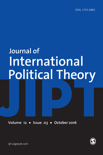
Journal of International Political Theory
Pioneering Scholarly Conversations in Political ScienceThe Journal of International Political Theory, published by SAGE Publications Ltd, is an esteemed academic journal dedicated to advancing the field of political theory on a global scale. With an ISSN of 1755-0882 and an E-ISSN of 1755-1722, this journal serves as a crucial platform for rigorous scholarship that intersects various domains including sociology and political science. Recognized as a leading publication in both the Q1 category for Social Sciences (miscellaneous) and Sociology and Political Science, it ranks in the top tiers of Scopus’ rankings, evidencing its influence and rigor within the academic community. From its base in the United Kingdom, the journal promotes a diverse range of theoretical perspectives and methodologies, fostering a vibrant dialogue among researchers and practitioners. While it does not operate under an open access model, the journal remains accessible to a broad audience of scholars eager to engage with cutting-edge debates in international political theory. The Journal of International Political Theory is committed to shaping contemporary understanding of political challenges, making it an essential read for researchers, professionals, and students alike.

American Political Thought
Unraveling the Tapestry of American Political TheoryAmerican Political Thought is a leading journal in the field of political science, published by the University of Chicago Press. With its ISSN 2161-1580 and E-ISSN 2161-1599, it provides a platform for rigorous scholarship that explores the intricate intersections of political theory and contemporary political issues. Established in 2015, the journal aims to delve into the rich tapestry of American political thought, offering a comprehensive examination of its historical evolution and modern implications. Ranked Q2 in both Political Science and Sociology categories for 2023, it is recognized for contributing significant discourse to its fields, despite its emerging status reflected by its Scopus rankings. Although it currently does not operate under an open access model, American Political Thought remains a valuable resource for researchers, professionals, and students seeking to engage with cutting-edge ideas and debates that shape the landscape of political theory today.

JOURNAL OF VALUE INQUIRY
Navigating the Philosophical Landscape of Law and EthicsJOURNAL OF VALUE INQUIRY, published by Springer, is a distinguished academic journal that has been a vital platform for the advancement of philosophical discourse since its inception in 1967. With an ISSN of 0022-5363 and an E-ISSN of 1573-0492, this journal focuses on the intricate intersection of philosophy, law, and social sciences, achieving impressive rankings in various categories with a Q1 designation in Philosophy and noteworthy placements in Law and Social Sciences as of 2023. The journal operates from Dordrecht, Netherlands, and serves as a vital resource for researchers, scholars, and students interested in ethical theories, the foundations of values, and their implications across diverse contexts. Though it is not an open-access journal, it maintains rigorous academic standards, embodying a commitment to contribute to the ongoing discussions in the philosophy of values. With its convergence extending to the horizon of 2024, JOURNAL OF VALUE INQUIRY continues to shape critical thought and foster scholarly dialogue within the realms of humanities and social sciences.
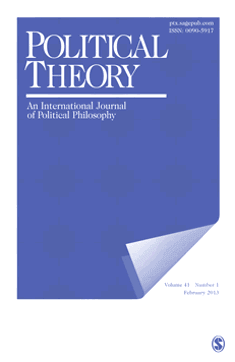
POLITICAL THEORY
Bridging Theory and Practice in Political SciencePOLITICAL THEORY, published by SAGE Publications Inc., is a premier academic journal that stands at the intersection of history, sociology, and political science. With an impactful presence since its inception in 1973, it has been a vital platform for scholarly discourse, advancing theoretical frameworks and empirical studies that invite critical engagement with contemporary political issues. The journal boasts a distinguished Q1 ranking in both History and Sociology and Political Science, reflecting its significance and influence within the academic community. Its rigorous peer-review process ensures that only the most innovative and insightful research is published, appealing to researchers, professionals, and students alike. Although not an open-access journal, its extensive contributions are accessible through a variety of academic databases, making it a crucial resource for those seeking to deepen their understanding of political theory and its applications. With an evolving scope that addresses pressing global challenges, POLITICAL THEORY remains an essential read for anyone invested in the complexities of political thought and historical context.
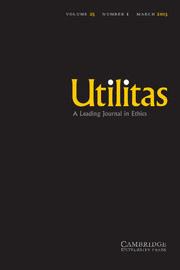
Utilitas
Engaging scholars in the dialogue of modern philosophy.Utilitas, published by CAMBRIDGE UNIVERSITY PRESS, is a prominent journal in the fields of Philosophy and Social Sciences, specifically Sociology and Political Science. Established in 1989, this esteemed journal has developed a reputation for its rigorous peer-reviewed articles that explore significant philosophical theories and their implications in societal contexts. With an impressive impact factor and consistently ranking in the Q1 category for Philosophy and Q2 for Sociology and Political Science, Utilitas serves as a vital platform for scholars to disseminate innovative research and engage with contemporary debates. The journal provides a comprehensive range of studies, emphasizing critical approaches to utilitarianism and ethical considerations in modern society. Researchers, professionals, and students alike will find Utilitas an invaluable resource, fostering an environment of intellectual growth and discourse in the ever-evolving landscape of philosophy and social science.
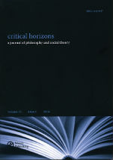
Critical Horizons
Innovating Perspectives in Philosophy and Political ScienceCritical Horizons is a distinguished academic journal published by Routledge Journals, Taylor & Francis Ltd, focusing on the interdisciplinary spheres of Philosophy and Sociology and Political Science. Founded in 2003, this journal caters to a global audience of researchers, professionals, and students by facilitating critical dialogues on pressing philosophical inquiries and sociopolitical issues. With an HIndex that reflects its scholarly impact, it has earned a reputable standing in its category, achieving a Q2 ranking in both Philosophy and Sociology and Political Science as of 2023. The journal's comprehensive scope encourages contributions that challenge conventional wisdom and stimulate innovative thinking within these disciplines. Although not open access, Critical Horizons remains a valuable resource for contemporary scholarship, evidenced by its substantial presence in Scopus rankings—boasting a 70th percentile in Arts and Humanities for Philosophy. Researchers and practitioners alike will find this journal an essential platform for exploring the critical intersections of knowledge and society as we approach its convergence year of 2024.